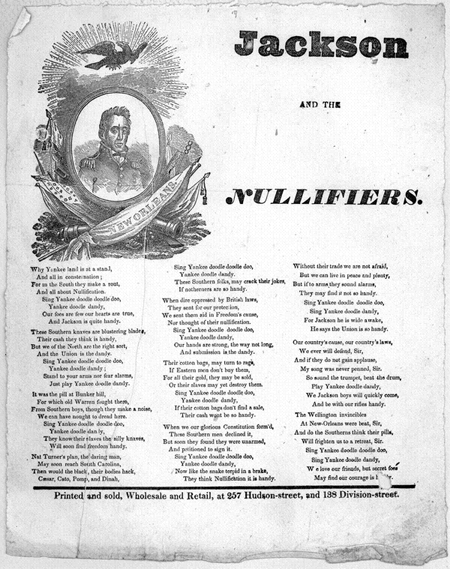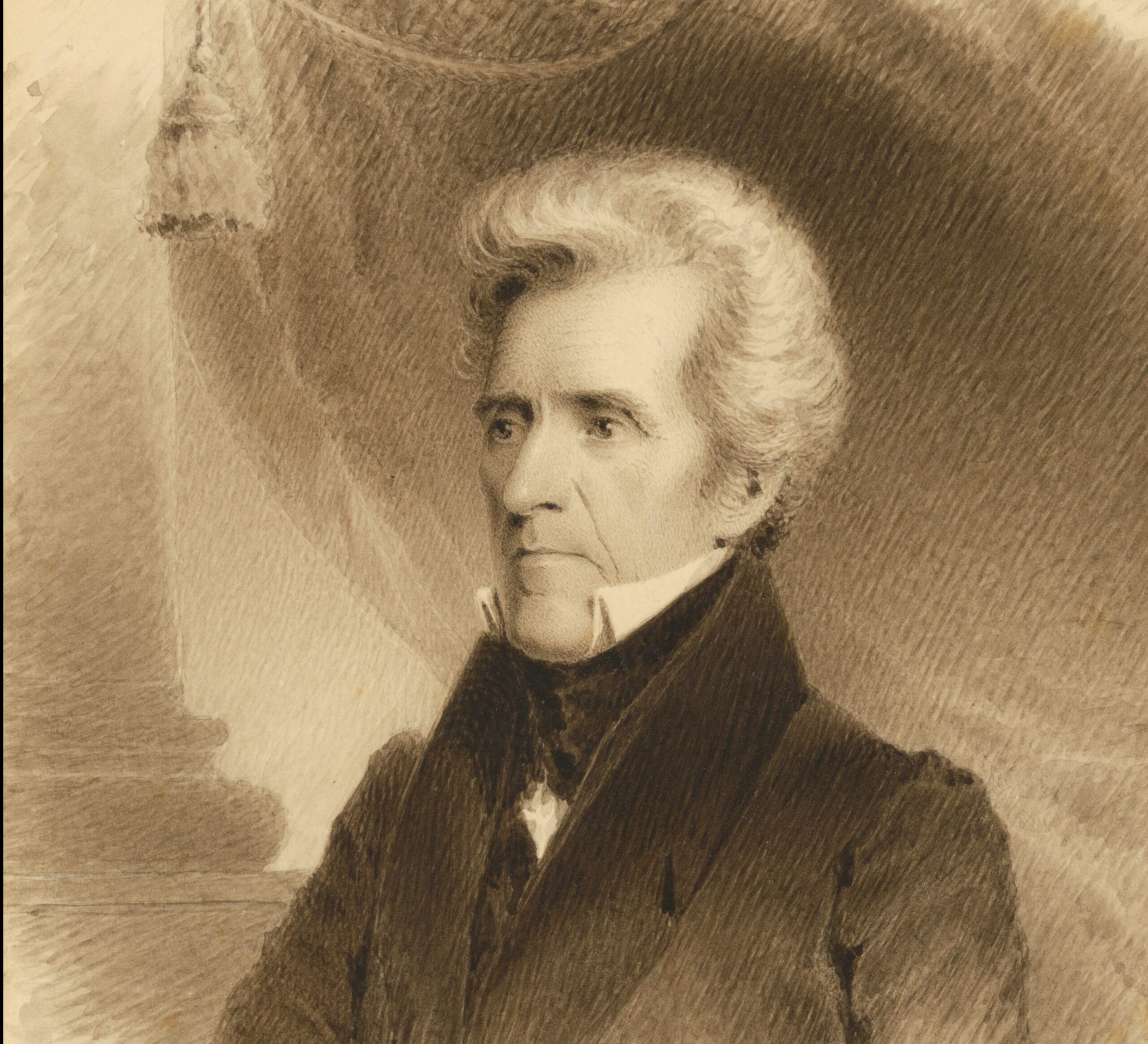Pres. Andrew Jackson regarded the South Carolina Ordinance of Nullification as a clear threat to the federal union and to national authority. He reacted by submitting to Congress a Force Bill authorizing the use of federal troops in South Carolina if necessary to collect tariff duties. On December 10, 1832, Jackson issued his “Proclamation to
The Nullification Crisis – Bill of Rights Institute
On December 10, 1832, President Andrew Jackson issued a Proclamation to the People of South Carolina (also known as the “Nullification Proclamation”) that disputed a states’ right to nullify a federal law. Jackson’s proclamation was written in response to an ordinance issued by a South Carolina convention that declared that the tariff acts of 1828 and 1832 “are unauthorized by the

Source Image: slideplayer.com
Download Image
The Nullification Crisis | Background | Background The relationship between the North and the South was tenuous when Andrew Jackson came to office in 1828. Ever since the Constitutional Convention of 1787, northerners and southerners had fought over slavery and tariffs. Each region wanted to make sure their economies were protected in the new Union.

Source Image: primarysourcenexus.org
Download Image
PROCLAMATION, BY ANDREW JACKSON, PRESIDENT OF THE UNITED STATES | Andrew Jackson Jackson responded, however, by declaring in the December 1832 Nullification Proclamation that a state did not have the power to void a federal law. The governor of South Carolina, Robert Hayne, elected in 1832, was a strong proponent of states’ rights and the theory of nullification. With the states and the federal government at an impasse

Source Image: reddit.com
Download Image
Why Was Andrew Jackson Opposed To The Doctrine Of Nullification
Jackson responded, however, by declaring in the December 1832 Nullification Proclamation that a state did not have the power to void a federal law. The governor of South Carolina, Robert Hayne, elected in 1832, was a strong proponent of states’ rights and the theory of nullification. With the states and the federal government at an impasse Andrew Jackson, a slaveowner with southern loyalties and a proponent of states’ rights, inherited the struggle over the Tariff of 1828 when he was elected president. He had strong feelings about state nullification, which he expressed in an official proclamation against nullification: “Disunion by armed force is treason.” The president
Andrew Jackson’s response to the Nullification Crisis, c. 1830 : r/HistoryMemes
Transcript. By Andrew Jackson, President of the United States Whereas a convention assembled in the State of South Carolina have passed an ordinance by which they declare “that the several acts and parts of acts of the Congress of the United States purporting to be laws for the imposing of duties and imposts on the importation of foreign commodities, and now having actual operation and effect Andrew Jackson – Presidency, Facts & Children

Source Image: biography.com
Download Image
Annual Message to Congress (1830) | Teaching American History Transcript. By Andrew Jackson, President of the United States Whereas a convention assembled in the State of South Carolina have passed an ordinance by which they declare “that the several acts and parts of acts of the Congress of the United States purporting to be laws for the imposing of duties and imposts on the importation of foreign commodities, and now having actual operation and effect

Source Image: teachingamericanhistory.org
Download Image
The Nullification Crisis – Bill of Rights Institute Pres. Andrew Jackson regarded the South Carolina Ordinance of Nullification as a clear threat to the federal union and to national authority. He reacted by submitting to Congress a Force Bill authorizing the use of federal troops in South Carolina if necessary to collect tariff duties. On December 10, 1832, Jackson issued his “Proclamation to

Source Image: billofrightsinstitute.org
Download Image
PROCLAMATION, BY ANDREW JACKSON, PRESIDENT OF THE UNITED STATES | Andrew Jackson The Nullification Crisis | Background | Background The relationship between the North and the South was tenuous when Andrew Jackson came to office in 1828. Ever since the Constitutional Convention of 1787, northerners and southerners had fought over slavery and tariffs. Each region wanted to make sure their economies were protected in the new Union.

Source Image: williamreesecompany.com
Download Image
The First Populist’ Review: Jackson’s Pugnacious Presidency – WSJ Feb 9, 2023Conclusion. The Nullification Crisis of 1832-1833 was an American political crisis that has been largely overlooked today by many, but was one that had far-ranging impacts on antebellum American history. The crisis set the stage for the battle between Unionism and state’s rights, which eventually led to the Civil War.

Source Image: wsj.com
Download Image
Nullification Crisis | Significance, Cause, President, & States Rights | Britannica Jackson responded, however, by declaring in the December 1832 Nullification Proclamation that a state did not have the power to void a federal law. The governor of South Carolina, Robert Hayne, elected in 1832, was a strong proponent of states’ rights and the theory of nullification. With the states and the federal government at an impasse

Source Image: britannica.com
Download Image
Letter from Willie Blount to Andrew Jackson, June, 1833 – Andrew Jackson Collection – Tennessee Virtual Archive Andrew Jackson, a slaveowner with southern loyalties and a proponent of states’ rights, inherited the struggle over the Tariff of 1828 when he was elected president. He had strong feelings about state nullification, which he expressed in an official proclamation against nullification: “Disunion by armed force is treason.” The president

Source Image: teva.contentdm.oclc.org
Download Image
Annual Message to Congress (1830) | Teaching American History
Letter from Willie Blount to Andrew Jackson, June, 1833 – Andrew Jackson Collection – Tennessee Virtual Archive On December 10, 1832, President Andrew Jackson issued a Proclamation to the People of South Carolina (also known as the “Nullification Proclamation”) that disputed a states’ right to nullify a federal law. Jackson’s proclamation was written in response to an ordinance issued by a South Carolina convention that declared that the tariff acts of 1828 and 1832 “are unauthorized by the
PROCLAMATION, BY ANDREW JACKSON, PRESIDENT OF THE UNITED STATES | Andrew Jackson Nullification Crisis | Significance, Cause, President, & States Rights | Britannica Feb 9, 2023Conclusion. The Nullification Crisis of 1832-1833 was an American political crisis that has been largely overlooked today by many, but was one that had far-ranging impacts on antebellum American history. The crisis set the stage for the battle between Unionism and state’s rights, which eventually led to the Civil War.